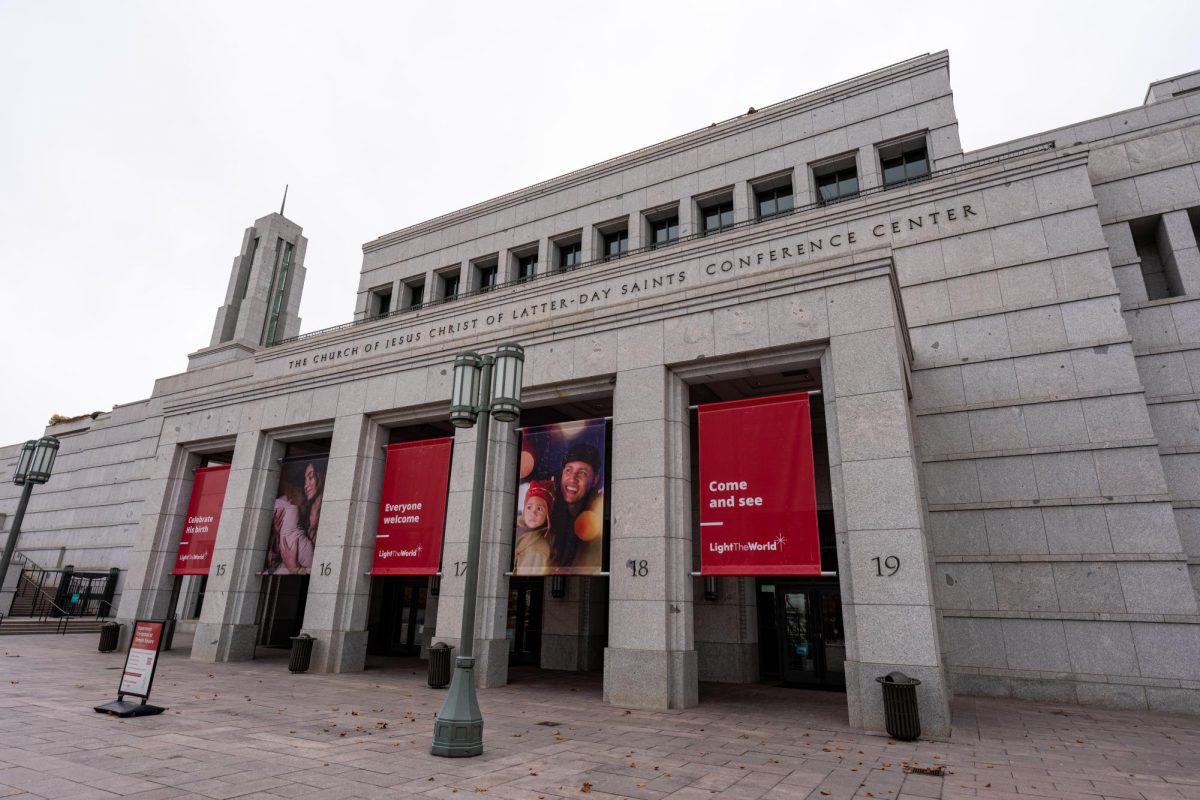
Xiangyao tang
The Church of Jesus Christ of Latter-day Saints Conference Center in Salt Lake City on Nov. 28, 2022. (Photo by Xiangyao "Axe" Tang | The Daily Utah Chronicle)
California’s Proposition 8, a 2008 ballot measure that sought to amend the California Constitution to define marriage as between a man and a woman, overturned the state’s Supreme Court ruling that legalized same-sex marriage.
Though this happened in California, The Church of Jesus Christ of Latter-day Saints, a Utah-based religious institution, greatly influenced the passing of the amendment. Its actions regarding Proposition 8 set a precedent for the Church and its culture in Utah.
For queer people and the Church to peacefully coexist, the Church must acknowledge the harm it caused with Proposition 8 and must listen to its queer members to figure out how to move forward.
Belief or Discrimination?
From conversion therapy in the ’70s at Brigham Young University, an LDS Church-owned school, to excommunicating gay couples and restricting their children’s membership, the Church hasn’t exactly been queer-friendly.
The Church displays its anti-queer beliefs in current documents like the 1995 Family Proclamation. Church leaders spread anti-queer rhetoric over the pulpit, like apostle Jeffrey Holland reiterating the church’s “musket fire” analogy in 2021. BYU’s current honor code also bans same-sex romantic behavior.
Calvin Burke, an LGBTQ+ member of the LDS Church, asserted that queerphobia is not intrinsic to the religion and “doesn’t jibe” with its scriptures. The Church’s position on Proposition 8 was “unnecessarily antagonistic,” he said.
Proposition 8 & Beyond
The Church campaigned against gay marriage in California and Hawaii in the ’90s. In 2008, it sent a letter to California congregations, asking members to do all they could, including donating their “means and time” to support Proposition 8.
According to the documentary 8: The Mormon Proposition, local LDS leaders pressured members to donate money to the cause, and the church raised millions for it. As shown in leaked Church documents, the Church’s “grassroots program” trained members to persuade voters in favor of the amendment. Members went door-to-door advocating for Proposition 8.
Utah doesn’t have a clear separation of church and state. Due to the state’s religious culture, the Church’s policies also affect Utahns who aren’t Church members. The Church has the right to its belief system, but it must not push harmful legislation.
The Church’s website states that “obedience is the first law of heaven.” Members’ support of Proposition 8 was proof of their obedience to Church leaders, who they believe speak for God. This indicates that if leaders supported queer people, many members would follow suit. It might earn the Church a better standing with queer communities inside and outside the church and make Utah safer for them.
Last year, the Church expressed support for the Respect for Marriage Act, because it included “necessary protections for religious freedom” while codifying same-sex and interracial marriage.
But since the Church hasn’t apologized for its shameful actions in 2008, how can the community know if its leaders feel remorseful? How can queer Latter-day Saints know if their Church is a safe place?
Time for Change
Queer and LDS aren’t mutually exclusive terms. According to The Salt Lake Tribune, over one-fifth of LDS college students in the U.S. identified as LGBTQ+. When the Church advocates against queer rights, it hurts its own members and loved ones.
“We’re not some outside group,” said Burke. “We’re y’all. We sit on the same pews.”
The Church also believes in loving everyone, but this rings hollow to queer ears. Love involves owning up to wrongdoing and making amends.
Burke said Church leadership must seek to understand and listen to those it hurt. He’d like to see systemic and discursive changes, over the pulpit and in the handbook, that honor LGBTQ+ people within the Church. Until it does this, he said, “The Church will continue to be essentially a haven for folks who are deeply prejudiced.”
Local church groups must work to become safe for queer members. Leaders must invite excommunicated queer people back to Church. If the Church really has changed since Proposition 8, advocating for queer rights would show queer members that their religion supports them.
Still, while the Church must be held accountable, it cannot expect forgiveness.
LDS and queer people will coexist, whether in the same state, classroom or meetinghouse. Church leaders must apologize and try to repair the harm they caused by pushing Proposition 8 and other anti-queer policies and practices.
There is no battle — LGBTQ+ people are not attacking the Church. Members should put away their muskets and bring out their compassion.
c.jarvis@dailyutahchronicle.com
@carolinegjarvis
